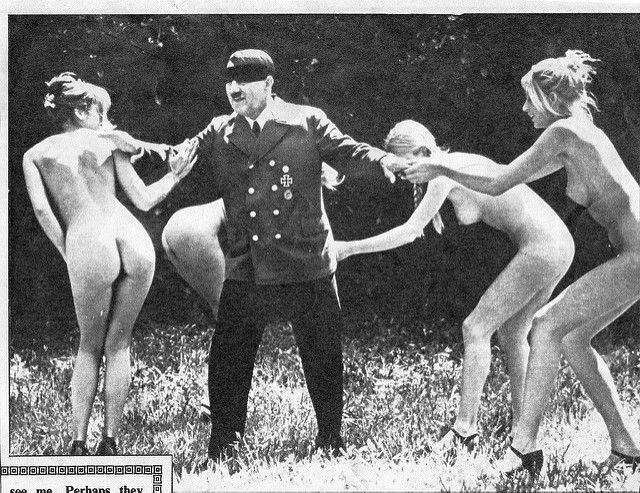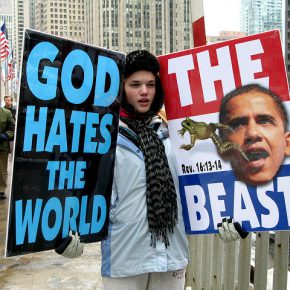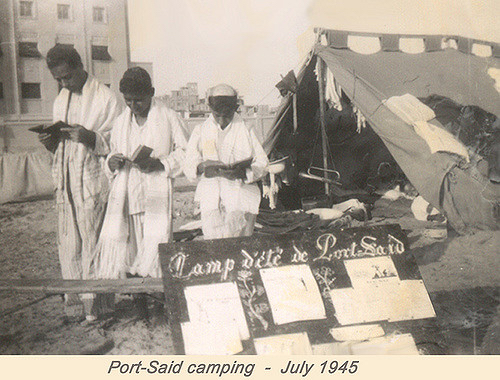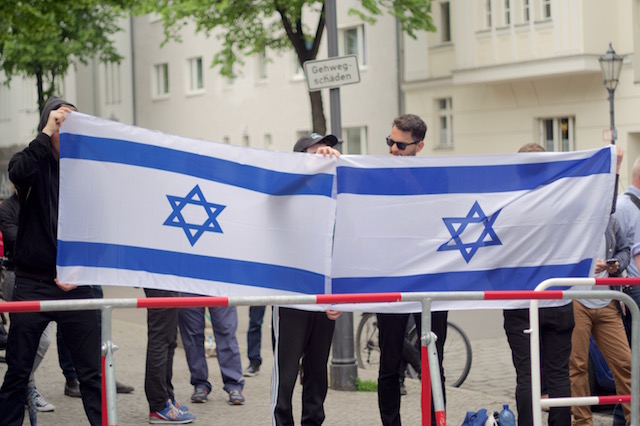The vast majority of the Protestants of Germany belonged to one of the 28 Landeskirchen (Lutheran, Reformed or Uniate), of which the largest was the Church of the Old Prussian Union, with 18 million members. The Landeskirchen were independent members of the German Evangelical Church Union, founded in 1922. In all, there were forty-five million Germans who were, nominally at least, members of the Protestant Church.
In 1932, members of the Church who supported Hitler had founded the “German Christians’ Faith Movement”. These “German Christians” demanded the creation of one Protestant Church, the application of the Fuehrer principle in Church affairs, the introduction of racialism within the Church, the “Germanization” of Christianity (the “Aryan Jesus”!) and the elimination of “Jewish influence” from teaching, liturgy and preaching.
In 1933, some 3000 pastors belonged to this group. Church elections took place on July 23, 1933. On the eve of the elections, Hitler made an unexpected radio appeal asking the electorate to vote (as) “German Christians.” They won a decisive victory.
On September 21, 1933, Rev. Martin Niemoeller and others created the “Pastors’ Emergency League”, which opposed the German Christians. In the beginning, Niemoeller’s group was definitely in the minority. By December 1933, its membership had grown to 6,000. Between the two groups, a majority tried to remain neutral while more or less sympathizing with the group of Niemoeller, but in practice obeying Hitler’s orders without open protest.
After a protege of Hitler, Ludwig Mueller, had been elected as Reich Bishop under pressure of the Government, Niemoeller’s opposition group constituted the “Confessing Church” which declared itself to be the legitimate Protestant Church of Germany and set up a provisional Church government. The German Christians had, in the meantime, gained control in several Landeskirchen, sometimes with the active help of the National Socialist party.
In April 1933, the Landeskirche of Thuringia required of its clergy a formal oath of allegiance to Hitler; the “Thuringian Christians” wanted to give this symbol of unconditional obedience to Hitler as a birthday present. There was a division in other Landeskirchen, as for instance in the largest: the Church of the Old-Prussian Union.

In the summer of 1933, a law had been issued forbidding the appointment of pastors or Church officers of “non-Aryan descent” and ordering the dismissal of such pastors and Church officers. In its session on September 5, 1933, the Synod of the Old Prussian Union accepted this law; the opposition party protested and, when this was of no avail, left the meeting. Later on, the opposition organized the “Confessing Synod of the Evangelical Church of the Old-Prussian Union.”
It is not my intention to record the contents of statements issued by Churches or Church leaders on behalf of Christians of Jewish origin. It is of importance, however, to know to what extent the German Christians supported discrimination against these members of the Church, and, also, to know that the Confessing Church defended them. Thus I mention the more important statements, which were issued, without recording their full contents. There was sharp controversy and much discussion as to whether the anti-Jewish laws should be applied within the Church.
The following persons and institutions protested against such a measure: the Theological Faculty of the University of Marburg (Sept. 19, 1933); the Theological Faculty of the University of Erlangen (Sept. 25, 1933); Rev. Martin Niemoeller (Nov. 2, 1933), and Prof. Rudolf Bultmann (Dec., 1933).
On the other hand, the German Christians declared at the beginning of April 1933 that only those who were “of pure German blood” should be admitted to the ministry. On May 26, 1932, they had already decided to consider missionary work amongst the Jews as a great danger “as it is the entrance gate for foreign blood into our national body”.
The example of the Synod of the Old-Prussian Union (see above) was followed by other Landeskirchen, as for instance in Saxony, Thuringia and Braunschweig: ministers of Jewish origin were to be dismissed. The Church in Saxony even voted, on Dec. 10, 1933, to accept the principles of blood and race, and that only those who according to the laws of the state were compatriots should be members of the national Church!

The decision of the Church of Saxony was publicly rejected by the Theological Faculty of the University of Leipzig, and by the Pastors’ Society of the Rhine. The majority of the Theological Faculty of the University of Berlin, however, supported the racialism of the Saxonians. This all happened in the years 1933-1934. In those days, it certainly needed courage to stand up publicly for the rights of Christians of Jewish origin in the Church. It should be noted, however, that the publications mentioned above did not publicly oppose discrimination against the Jews in general, nor even discrimination against Christians of Jewish origin outside the Church.
In March 1935, the Confessing Synod of the Evangelical Church of the Old-Prussian Union sent a “Word to the Congregations”, which was read from the pulpits. We quote the following:
“We believe that our nation is threatened by a mortal danger. This danger lies in a new religion…. in it, racial and nationalistic ideology becomes supreme. Blood and race, nationality, honour and freedom become its idols. … Whoever substitutes blood, race and nationality as the creator and source of authority instead of God, undermines the state.”
The government struck back with arrests. 500 pastors were imprisoned.
After the notorious Laws of Nuremberg had been promulgated, only individuals in the Confessing Church pleaded for the issue of a public declaration. Dietrich Bonhoeffer said : “Only the man who loudly cries out on behalf of the Jews, is at liberty to sing the Gregorian chants”.
The “Council of Brethren” of the Confessing Church stated, in a declaration in defense of the right to baptize Jews, in September, 1935: “We only say the necessary minimum (alas, perhaps even not the minimum) concerning things about which we are not allowed to keep silent…”
The Provisional Church Council of the Confessing Church sent a Memorandum to Hitler, in May, 1936. We quote the following from it:
“… When blood, race, nationality and honour are thus raised to the rank of qualities that guarantee eternity, the Evangelical Christian is bound by the first commandment to reject that assumption. When the Aryan human being is glorified, God’s word bears witness to the sinfulness of all men. When in the framework of the National Socialist ideology, anti-Semitism is forced on the Christian obliging him to hate the Jews, he has nonetheless the divine command to love his neighbour…”
The Memorandum, which was published in the foreign press without the consent of the Confessing Church, resulted in the arrest of Dr. Weissler who worked in the office of the Provisional Church Council. He perished in a concentration camp.
Adapted from The Grey Book, by Johan M. Snoek. Photographs courtesy of Jim Devlin, RV 1864 and Exopolitika Magyarorszag. Published under a Creative Commons license.





